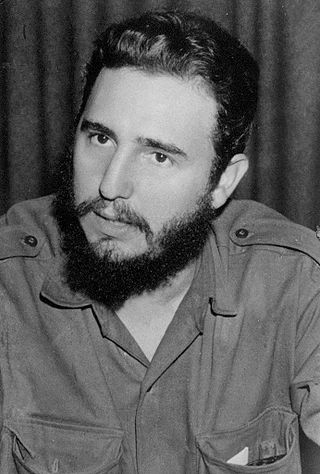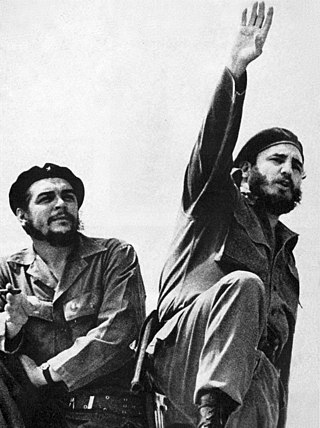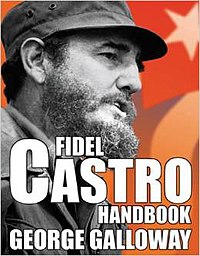The island of Cuba was inhabited by various Amerindian cultures prior to the arrival of the explorer Christopher Columbus in 1492. After his arrival, Spain conquered Cuba and appointed Spanish governors to rule in Havana. The administrators in Cuba were subject to the Viceroy of New Spain and the local authorities in Hispaniola. In 1762–63, Havana was briefly occupied by Britain, before being returned to Spain in exchange for Florida. A series of rebellions between 1868 and 1898, led by General Máximo Gómez, failed to end Spanish rule and claimed the lives of 49,000 Cuban guerrillas and 126,000 Spanish soldiers. However, the Spanish–American War resulted in a Spanish withdrawal from the island in 1898, and following three-and-a-half years of subsequent US military rule, Cuba gained formal independence in 1902.

The economy of Cuba is a planned economy dominated by state-run enterprises. Most of the labor force is employed by the state. In the 1990s, the ruling Communist Party of Cuba encouraged the formation of worker co-operatives and self-employment. In the late 2010s, private property and free-market rights along with foreign direct investment were granted by the 2018 Cuban constitution. Foreign direct investment in various Cuban economic sectors increased before 2018. As of 2021, Cuba's private sector is allowed to operate in most sectors of the economy. As of 2023, public-sector employment was 65%, and private-sector employment was 35%, compared to the 2000 ratio of 76% to 23% and the 1981 ratio of 91% to 8%. Investment is restricted and requires approval by the government. In 2021, Cuba ranked 83rd out of 191 on the Human Development Index in the high human development category. As of 2012, the country's public debt comprised 35.3% of GDP, inflation (CDP) was 5.5%, and GDP growth was 3%. Housing and transportation costs are low. Cubans receive government-subsidized education, healthcare, and food subsidies.

Cuba's foreign policy has been fluid throughout history depending on world events and other variables, including relations with the United States. Without massive Soviet subsidies and its primary trading partner, Cuba became increasingly isolated in the late 1980s and early 1990s after the fall of the USSR and the end of the Cold War, but Cuba opened up more with the rest of the world again starting in the late 1990s when they have since entered bilateral co-operation with several South American countries, most notably Venezuela and Bolivia beginning in the late 1990s, especially after the Venezuela election of Hugo Chávez in 1999, who became a staunch ally of Castro's Cuba. The United States used to stick to a policy of isolating Cuba until December 2014, when Barack Obama announced a new policy of diplomatic and economic engagement. The European Union accuses Cuba of "continuing flagrant violation of human rights and fundamental freedoms". Cuba has developed a growing relationship with the People's Republic of China and Russia. Cuba provided civilian assistance workers – principally medical – to more than 20 countries. More than one million exiles have escaped to foreign countries. Cuba's present foreign minister is Bruno Rodríguez Parrilla.

Fidel Alejandro Castro Ruz was a Cuban revolutionary and politician who was the leader of Cuba from 1959 to 2008, serving as the prime minister of Cuba from 1959 to 1976 and president from 1976 to 2008. Ideologically a Marxist–Leninist and Cuban nationalist, he also served as the first secretary of the Communist Party of Cuba from 1965 until 2011. Under his administration, Cuba became a one-party communist state; industry and business were nationalized, and socialist reforms were implemented throughout society.

Raúl Modesto Castro Ruz is a Cuban retired politician and general who served as the first secretary of the Communist Party of Cuba, the most senior position in the one-party communist state, from 2011 to 2021, and President of Cuba between 2008 and 2018, succeeding his brother Fidel Castro.

The Cuban Revolution was a military and political effort to overthrow the government of Cuba between 1953 and 1959. It began after the 1952 Cuban coup d'état which placed Fulgencio Batista as head of state. After failing to contest Batista in court, Fidel Castro organized an armed attack on the Cuban military's Moncada Barracks on July 26, 1953. The rebels were arrested and while in prison formed the 26th of July Movement (M-26-7). After gaining amnesty the M-26-7 rebels organized an expedition from Mexico on the Granma yacht to invade Cuba. In the following years the M-26-7 rebel army would slowly defeat the Cuban army in the countryside, while its urban wing would engage in sabotage and rebel army recruitment. Over time the originally critical and ambivalent Popular Socialist Party would come to support the 26th of July Movement in late 1958. By the time the rebels were to oust Batista the revolution was being driven by the Popular Socialist Party, 26th of July Movement, and the Revolutionary Directorate of March 13.
The Respect Party was a left-wing to far-left socialist political party active in the United Kingdom between 2004 and 2016. At the height of its success in 2007, the party had one Member of Parliament (MP) in the House of Commons and nineteen councillors in local government.

Cuba, officially the Republic of Cuba, is an island country, comprising the island of Cuba, Isla de la Juventud, archipelagos, 4,195 islands and cays surrounding the main island. Cuba is located where the northern Caribbean Sea, Gulf of Mexico, and Atlantic Ocean meet. Cuba is located east of the Yucatán Peninsula (Mexico), south of both the American state of Florida and the Bahamas, west of Hispaniola, and north of Jamaica and the Cayman Islands. Havana is the largest city and capital; other major cities include Santiago de Cuba and Camagüey. The official area of the Republic of Cuba is 109,884 km2 (42,426 sq mi) but a total of 350,730 km2 (135,420 sq mi) including the exclusive economic zone. Cuba is the second-most populous country in the Caribbean after Haiti, with over 11 million inhabitants.
Frank País García was a Cuban revolutionary who campaigned for the overthrow of General Fulgencio Batista's government in Cuba. País was the urban coordinator of the 26th of July Movement, and was a key organizer within the urban underground movement, collaborating with Fidel Castro's guerrilla forces which were conducting activities in the Sierra Maestra mountains. País was killed in the streets of Santiago de Cuba by the Santiago police on July 30, 1957.

Cuba and the United States restored diplomatic relations on July 20, 2015, after relations had been severed in 1961 during the Cold War. U.S. diplomatic representation in Cuba is handled by the United States Embassy in Havana, and there is a similar Cuban Embassy in Washington, D.C. The United States, however, continues to maintain its commercial, economic, and financial embargo, making it illegal for U.S. corporations to do business with Cuba.

Relations between Cuba and Venezuela were established in 1902. The relationship deteriorated in the 1960s and Venezuela broke relations in late 1961 following the Betancourt Doctrine policy of not having ties with governments that had come to power by non-electoral means. A destabilizing factor was the Cuban support for the antigovernment guerrilla force that operates in remote rural areas. Venezuela broke off relations with Cuba after the Machurucuto invasion in 1967, when Cuban trained guerrillas landed in Venezuela seeking to recruit guerrillas and overthrow the government of Raúl Leoni. Relations were reestablished in 1974.
The British left can refer to multiple concepts. It is sometimes used as shorthand for groups aligned with the Labour Party. It can also refer to other individuals, groups and political parties that have sought egalitarian changes in the economic, political, and cultural institutions of the United Kingdom. There are various subgroups, split between reformist and revolutionary viewpoints. Liberals, progressives and social democrats believe that equality can be accommodated into existing capitalist structures, but they differ in their criticism of capitalism and on the extent of reform and the welfare state. Anarchists, communists, and socialists, among others on the far left, on the other hand argue for abolition of the capitalist system.

Ernesto "Che" Guevara was an Argentine Marxist revolutionary, physician, author, guerrilla leader, diplomat, and military theorist. A major figure of the Cuban Revolution, his stylized visage has become a ubiquitous countercultural symbol of rebellion and global insignia in popular culture.

The legacy of Argentine Marxist revolutionary Che Guevara is constantly evolving in the collective imagination. As a symbol of counterculture worldwide, Guevara is one of the most recognizable and influential revolutionary figures of the twentieth century. However, during his life, and even more since his death, Che has elicited controversy and wildly divergent opinions on his personal character and actions. He has been both revered and reviled, being characterized as everything from a heroic defender of the poor, to a cold-hearted executioner.

George Galloway is a British politician, broadcaster, and writer who has served as Member of Parliament (MP) for Rochdale since the 2024 by-election. He has been the leader of the Workers Party of Britain since he founded it in 2019. From 1987 to 2010, and from 2012 to 2015, Galloway served as MP for four constituencies, first for the Labour Party and then from 2005 for the Respect Party, which he led from 2013 until its dissolution in 2016.

The Communist Party of Cuba is the sole ruling party of Cuba. It was founded on 3 October 1965 as the successor to the United Party of the Cuban Socialist Revolution, which was in turn made up of the 26th of July Movement and Popular Socialist Party that seized power in Cuba after the 1959 Cuban Revolution. The party governs Cuba as an authoritarian one-party state where dissidence and political opposition are prohibited and repressed. The Cuban constitution ascribes the role of the party to be the "leading force of society and of the state".

The Socialist Workers Party (SWP) is a far-left political party in the United Kingdom. Founded as the Socialist Review Group by supporters of Tony Cliff in 1950, it became the International Socialists in 1962 and the SWP in 1977. The party considers itself to be Trotskyist. Cliff and his followers criticised the Soviet Union and its satellites, calling them state capitalist rather than socialist countries.

The Communist Party of Great Britain (Marxist–Leninist), abbreviated CPGB-ML, is an anti-revisionist Marxist–Leninist communist party in the United Kingdom, active in England, Scotland, and Wales. The CPGB-ML was created after a split from the Socialist Labour Party (SLP) in 2004. The CPGB-ML publishes the bimonthly newspaper Proletarian, and the Marxist–Leninist journal Lalkar is also closely allied with the party. The party chair is Ella Rule.

The consolidation of the Cuban Revolution is a period in Cuban history typically defined as starting in the aftermath of the revolution in 1959 and ending in the first congress of the Communist Party of Cuba 1975, which signified the final political solidification of the Cuban revolutionaries' new government. The period encompasses early domestic reforms, human rights violations continuing under the new regime, growing international tensions, and politically climaxed with the failure of the 1970 sugar harvest.
The Workers Party of Britain (WPB), also called the Workers Party of Great Britain (WPGB) or Workers Party GB, is a socialist and socially conservative political party in the United Kingdom, formed in December 2019 and led by George Galloway, the Member of Parliament for Rochdale since a 2024 by-election.














